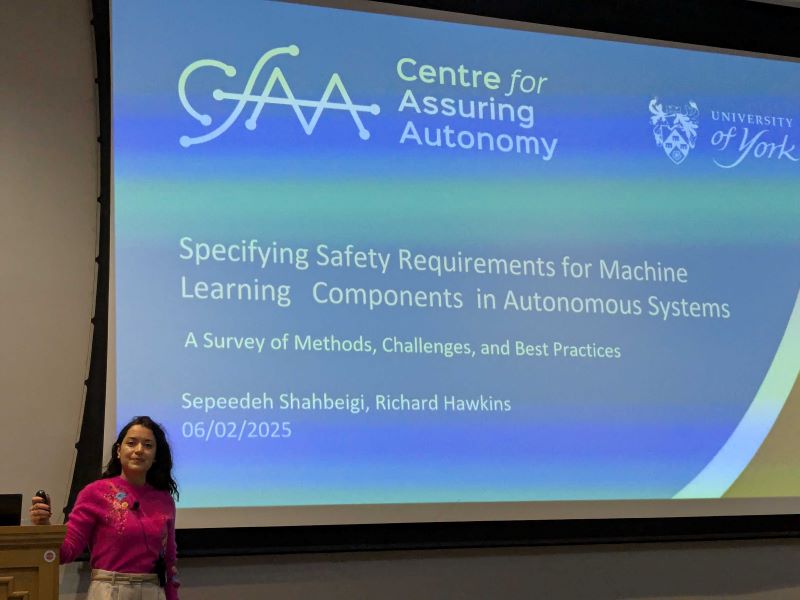CfAA team brings fresh perspectives to Safety Critical Systems Symposium
Posted on Thursday 20 February 2025

In the first CfAA keynote, Professor John McDermid OBE FREng, presented on AI Safety and Security and the challenges for the safety community in the emerging fields of Frontier AI. His presentation focused on the need for the safety community to work together to define a research agenda which meets these evolving challenges. It was a presentation which triggered engaged discussions amongst attendees about the use of LLMS in safety critical systems.
Professor Ibrahim Habli’s talk focused on the need to ensure the next generation of AI Safety professionals has solid experience in, and a well-rounded understanding of, safety in its technical and socio-technical perspective. He introduced SAINTS as the CDT making this a reality and several of the first PhD cohort attended SCSS and took part in the 5 minute pitch section of the conference.
In a technical-focused session, Dr Sepeedeh Shahbeigi presented an overview of existing literature on methods for the elicitation of safety requirements for ML components. This highlighted how complex and challenging a task it is to systematically derive traceable safety requirements specific to ML components in an autonomous system. In her presentation Dr Shahbeigi identified key challenges and limitations in current methods and proposed potential solutions.
Dr Kate Preston presented work completed alongside Professors Mark Sujan and Ibrahim Habli titled the “Assurance of AI and Autonomous Technology in Complex Environments: A Human-Centred Perspective”. The presentation and accompanying conference paper highlighted that traditional safety assurance focusing on technical performance should be completed in tandem with understanding how the new technology will interact with the wider socio-technical system. To support in showcasing the approaches and methods that can be applied to focus on these interactions, their research on developing a human-centred assurance framework was presented. The foundation of this framework was a review of 22 cross-sector demonstrators completed as part of the Assuring Autonomy International Programme, where the interactions and associated methods, in line with an extended work system model, were extracted.
In the final CfAA keynote Dr Richard Hawkins covered the need to improve safety case practice. In front of a packed room he discussed how safety cases are more important than ever so that we can address the safety of dynamic, autonomous systems using fast changing technology such as AI. However this requires that safety cases are used well. Dr Hawkins explained that it is improvements in the safety case process that will bring the most significant benefit, and described a process that builds on existing good practice as a way of addressing the key problems.
All the speaker presentations and videos can be found on the Safety Critical Systems Symposium SSS'25 website in their member section.
